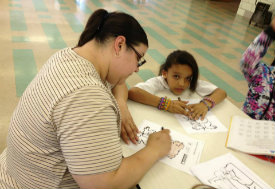Tips To Help Siblings Get Along

Bickering between siblings isn’t necessarily unusual and can be part of growing up as children navigate the world around them. That said, plenty of benefits exist when siblings enjoy one another’s company and serve as a mutual support system.
Establish Ground Rules
To help make that happen, Child Mind Institute shares suggestions, including to set ground rules when everyone is calm. Much of sibling conflict, an expert notes, flares up when children fight over limited access to something—whether that’s parental attention or a favorite toy. So, if, for example, your children fight over what shows to watch when they’re allowed to watch TV, create a schedule and post it. Perhaps one child can pick a half-hour show for Friday, and another one can pick the show for Saturday.
Use age-appropriate methods to share the rules. For example, for younger children who can’t read well quite yet, create visual schedules with pictures or use timers. Older children could follow written schedules or sign a contract. With teenagers, you may decide to ask them to help you brainstorm solutions.
Treat Every Child Consistently, Uniquely
MyParentToolKit.com points out how, when children have self-esteem and feel uniquely valued, they tend to have fewer reasons to squabble. Parents can help by not comparing siblings to one another or putting labels on their personalities. Rather than saying to one of your children that they’re your best helper, simply thank them for being helpful. Instead of calling a child lazy and comparing their messy room to the neater one of a sibling, you might say, “It seems to me your room might not be as tidy as it could be?” to open up a conversation with the child who has a messier room.
It can also help to spend one-on-one time with each child. You could play a game together, chat with one another, or go on a walk. If there isn’t time for that, you could invite a child to run errands with you to create a situation to provide them with undivided attention.
When Appropriate, Let Them Have Their Space and Sort Issues Out
Understood.org also offers recommendations. Sometimes, they note, siblings are simply spending too much time together and need a break. When they have time apart, perhaps with friends but not a sibling, they’ll likely appreciate one another more when they do spend time together. They can also explore what activities they personally enjoy.
Although it can be tempting to referee arguments, try not to. These disagreements can be valuable learning opportunities where children learn how to manage conflict through negotiation. You can listen to them express their feelings, and then encourage them to produce a workable solution together.
Also, create ways that your family can enjoy time together. These can include a Friday night board game tournament or movie night. You can allow children to rotate who gets to choose the game or recommend the film. You can also volunteer for a worthy cause as a family, allowing you to strengthen bonds while helping your community. Perhaps your children will have more ideas to explore!
Horizon’s Commitment to Social Skills and Emotional Awareness
At Horizon, we don’t just work with children to get them kindergarten ready; we’re invested in their social and emotional development, too. Our Step Up to Quality top-rated programs and quality teachers and staff work with kids to develop emotional growth and social skills that set them up for success at school and beyond.
Learn more about the benefits of Horizon Education Centers. Contact the center near you to schedule a tour today!






